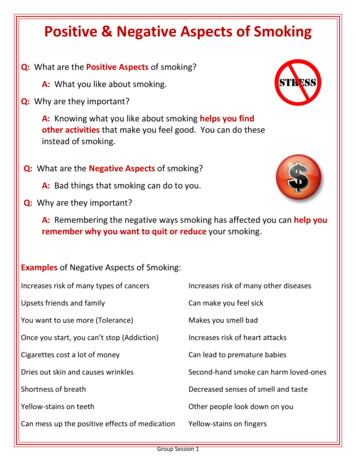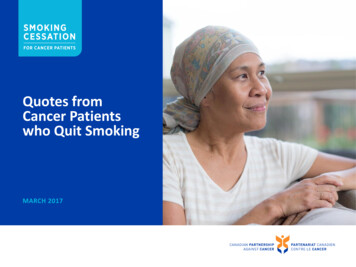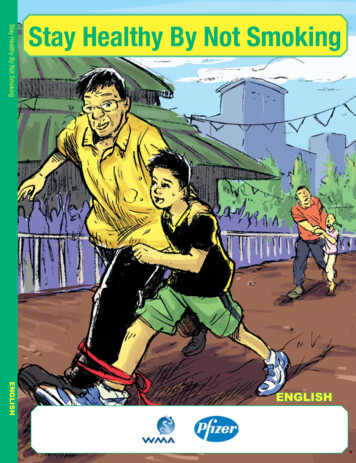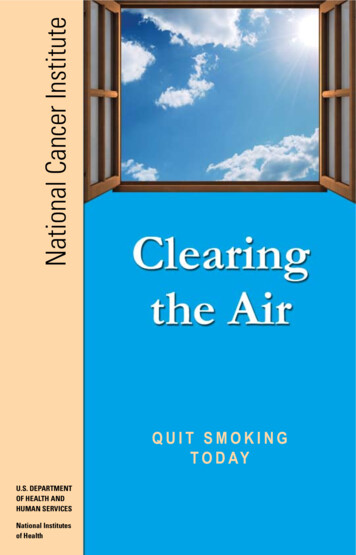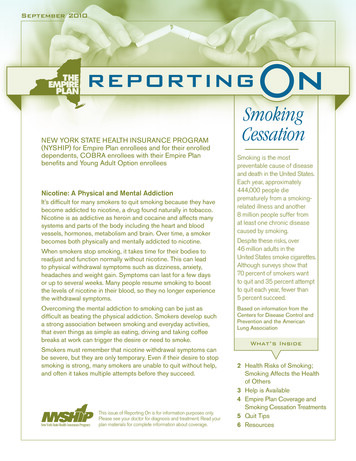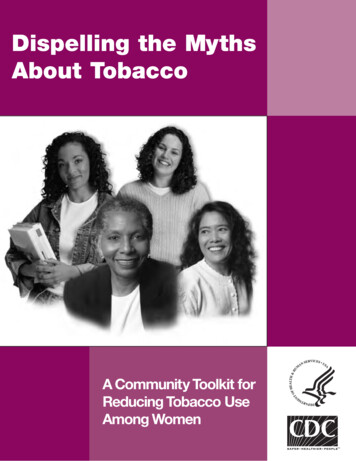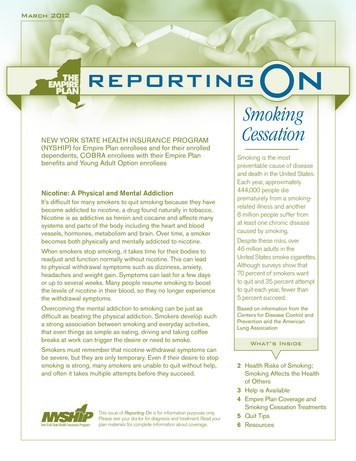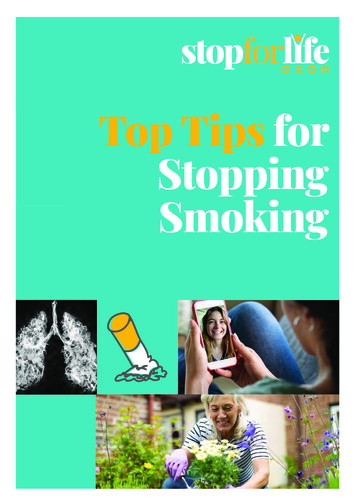
Transcription
Quit SmokingThe BasicsQuitting smoking is one of the most important things you can do for your health. The sooner you quit, the sooner yourbody can start to heal. You will feel better and have more energy to be active with your family and friends.Smoking hurts almost every part of the body.Smoking is the most preventable cause of death and disease in the United States.Smoking causes: Lung cancer and many other types of cancerHeart diseaseStrokeChronic obstructive pulmonary disease (COPD) and other lung diseasesPregnancy problemsGum diseaseVision lossType 2 diabetesRheumatoid arthritisLearn more about how smoking affects different parts of the body.Smoking hurts other people, too.Secondhand smoke can cause health problems for the people around you.In babies and children, breathing in secondhand smoke can cause: Sudden infant death syndrome (SIDS)PneumoniaBronchitisSevere asthma attacksEar infectionsIn adults, breathing in secondhand smoke can cause: Heart diseaseStrokeLung cancerYou can quit smoking.Quitting smoking is hard, but millions of people have done it successfully. In fact, more than half of Americans whohave ever smoked have quit. You could be one of them!Nicotine – the drug found in tobacco – is just as addictive as heroin or cocaine. It’s the nicotine in cigarettes thatcauses the strong feeling that you want to smoke (craving). Remember – quitting isn’t easy, but it is possible!Take these steps to help you quit: Make a list of the reasons you want to quit.Set a quit date and make a plan to deal with cravings.Ask your family, friends, and coworkers for support.Talk to your doctor about counseling and medicines that can help you quit.Call 1-800-QUIT-NOW (1-800-784-8669) or visit Smokefree.gov for free help.Find out more about steps you can take as you get ready to quit smoking.You will feel better after you quit.
Your body begins to heal as soon as you quit smoking. Here are some ways you will feel better: You will breathe more easily.Your senses of taste and smell will improve.You will have more energy.Your lungs will become stronger, making it easier for you to be active.You will cough and wheeze (struggle to breathe) less.Find out more about how quitting smoking will help your health.Quitting smoking will help you live a longer, healthier life.After you quit smoking: Your risk of having a heart attack or stroke goes down.Your lungs can fight off infection better.Your risk of dying from cancer goes down.Your blood pressure goes down.Your pulse and blood oxygen level return to normal.If you have children, you can help them be healthier by quitting smoking. Children whose parents smoke aroundthem are at higher risk for lung and ear infections.Check out these real stories of people who have been hurt by smoking.Will quitting make me gain weight?Some people worry about gaining weight when they quit smoking. The average weight gain after quitting smoking isabout 6 to 10 pounds.To help control your weight as you quit smoking: Get active. Aim for 2 hours and 30 minutes a week of moderate aerobic activity, like walking fast or dancing.Eat healthy snacks, like vegetables or fruit.Talk with your doctor about ways to control your weight.To learn more ways to watch your weight after quitting, check out these tips.Take Action!Take these steps to quit smoking.Write down your reasons to quit.Make a list of all the reasons you want to quit. For example, your reasons to quit might be to set a healthy examplefor your children and to save money. Keep the list with you to remind yourself why quitting is worth it.Set a quit date. Pick a date that gives you enough time to get ready to quit. But make sure it’s soon enough that you don’t loseyour motivation.Tell your family, friends, and coworkers about your quit date so they can support you.Make a quit plan. Think about situations that might trigger you to smoke. Plan how you will handle them without smoking.Right before your quit date, go through your house, car, and workplace to get rid of anything that has to do withsmoking. Throw away all your cigarettes, ashtrays, lighters, and matches.Clean your clothes so they don’t smell like smoke.Use this online quit plan tool and call the tobacco quitline at 1-800-QUIT-NOW (1-800-784-8669) for free support andhelp setting up your quit plan.Change your daily routine.Changing your routine on your quit date and afterward can help you break habits related to smoking.
Try taking a different route to work.For the first few weeks, avoid activities and places you connect with smoking.Do things and go places where smoking isn’t allowed.Make getting active and eating healthy part of your quit plan. Instead of smoking: eat healthy snacks, go forwalks, and drink lots of water.Break the connection between eating and smoking.Many people like to smoke when they finish a meal. Here are some ways to break the connection: Get up from the table as soon as you are done eating.Brush your teeth and think about the fresh, clean feeling in your mouth.Try going for a walk after meals.Deal with stress.Manage stress by creating peaceful times in your daily schedule. Try relaxation methods like deep breathing.You can also check out these tips for dealing with stress as you quit.Manage cravings.When you quit smoking, the urge to smoke will come and go, but it will gradually decrease over time. Most cravingsonly last a short time.Here are some ways to manage cravings: Do something else with your hands, like washing them, sorting the mail, or washing the dishes.Have healthy snacks ready, like carrots, apples, or sugar-free gum.Distract yourself with a new activity. Try doing crosswords or other puzzles.If you used to smoke while driving, try something new. Take public transportation or ride with a friend.Take several deep breaths to help you relax.Remember, quitting may be hard – so prepare yourself. Take this withdrawal quiz every day to see your progress.Talk with a doctor or pharmacist. A doctor or nurse can help you choose strategies for quitting smoking that are likely to work best for you.A doctor or a pharmacist can tell you about medicines that can improve your chances of quitting – and how to usethese medicines the right way.When you stop smoking, your body goes through withdrawal from nicotine. This means you may feel irritable,anxious, restless, or hungry. You may even have trouble concentrating or sleeping. Find out about medicines that canhelp with withdrawal.What about cost?You can get free help with quitting by calling 1-800-QUIT-NOW (1-800-784-8669) and by visiting Smokefree.gov.As a result of the Affordable Care Act, the health care reform law passed in 2010, insurance plans must cover someservices to help people quit smoking. Depending on your insurance, you may be able to get these services at no costto you.Check with your insurance company to find out what kind of counseling and medicines are included in your plan. Forinformation about other services covered by the Affordable Care Act, visit HealthCare.gov.Don’t give up!Remember, it takes time to overcome addiction. Check out these tips on staying smokefree.Learn from the past.
Many people try to quit more than once before they succeed. Most people who start smoking again do so within thefirst 3 months after quitting. If you’ve tried to quit before, think about what worked for you and what didn’t.Drinking alcohol and being around other smokers can make it harder to quit. If you are having a hard time "stayingquit," talk with your doctor about what types of counseling or medicines might help you. Remember, quitting willmake you healthier.Syndicated Content Details:Source URL: ource Agency: Healthfinder.gov (ODPHP-HF)Captured Date: 2017-09-06 14:27:04.0How to Quit Smoking - Quit Tips - Smoking & Tobacco UseBenefits of Quitting - How to Quit - Quit Smoking - Smoking & TobaccoUseBenefits of Quitting
Quitting smoking at any age has benefits.1 The sooner you quit, the sooner your body can begin to heal.1,2 Tobacco smoke harms nonsmokers, too.1,3 Quitting smoking is the single best way to protect your family from secondhand smoke. 4Reduced Risk for Various Health Issues1,2Some benefits of quitting smoking occur quickly; more occur over time. For example: Your risk for a heart attack drops sharply just 1 year after you quit smoking.
After 2 to 5 years, your chance for stroke could fall to about the same as a nonsmoker’s. Within 5 years of quitting, your chance of cancer of the mouth, throat, esophagus, and bladder is cut in half. Risks for other conditions—including ulcer, peripheral artery disease, and cancers of the larynx, lung, andcervix—are reduced after quitting. The risk of having a low birth weight baby drops to normal if you quit before pregnancy or during your firsttrimester.Other Benefits of Quitting Health benefits for people with diabetes who quit smoking begin immediately and include having better controlover blood sugar levels.1 If you quit smoking, you will breathe better and it will be easier to be active.1 By not smoking, you help protect family, friends, and coworkers from health risks associated with breathingsecondhand smoke. These include an increased risk for heart disease and lung cancer among adults. For babiesand children, risks include respiratory infections, ear infections, and sudden infant death syndrome (SIDS). 1,3References1. U.S. Department of Health and Human Services. A Report of the Surgeon General: How Tobacco Smoke CausesDisease: What It Means to You. Atlanta: U.S. Department of Health and Human Services, Centers for DiseaseControl and Prevention, National Center for Chronic Disease Prevention and Health Promotion, Office onSmoking and Health, 2010 [accessed 2013 June 5].2. U.S. Department of Health and Human Services. The Health Consequences of Smoking: What It Means toYou.Atlanta: U.S. Department of Health and Human Services, Centers for Disease Control and Prevention,National Center for Chronic Disease Prevention and Health Promotion, Office on Smoking and Health, 2004[accessed 2013 June 5].3. U.S. Department of Health and Human Services. The Health Consequences of Involuntary Exposure to TobaccoSmoke: A Report of the Surgeon General: Secondhand Smoke: What It Means To You. Atlanta: U.S. Departmentof Health and Human Services, Centers for Disease Control and Prevention, National Center for Chronic DiseasePrevention and Health Promotion, Office on Smoking and Health, 2006 [accessed 2013 June 5].
4. U.S. Department of Health and Human Services. The Health Consequences of Involuntary Exposure to TobaccoSmoke: A Report of the Surgeon General: Highlights: How to Protect Yourself and Your Loved Ones fromSecondhand Smoke [PDF–63 KB]. Atlanta: U.S. Department of Health and Human Services, Centers for DiseaseControl and Prevention, National Center for Chronic Disease Prevention and Health Promotion, Office onSmoking and Health, 2006 [accessed 2013 June 5].Content provided and maintained by the US Centers for Disease Control and Prevention (CDC). Please see oursystem usage guidelines and disclaimer.How To Handle Withdrawal Symptoms and Triggers When You DecideTo Quit SmokingKey Points Quitting is the only way that smokers can substantially reduce their risk of disease. Although quitting is difficult,millions of people have quit smoking for good. Many tips are offered in this fact sheet, but everyone is different sochoose the tips that will work best for you. In general, keeping busy and avoiding the things that tempt you tosmoke will help you manage withdrawal symptoms and avoid your triggers to smoke.Common withdrawal symptoms associated with quitting include nicotine cravings, anger, frustration, irritability,anxiety, depression, and weight gain. It may help to know that withdrawal symptoms are usually worst during thefirst week after quitting. From that point, the intensity of the symptoms drops over the first month. In themeantime, there are many steps you can take to make it easier to quit smoking.Triggers are the moods, feelings, places, or things that you do in your daily life that make you want to smoke.Triggers for smoking may include being around other smokers, feeling stressed, drinking coffee or tea, andenjoying a meal. Knowing your triggers helps you stay in control because you can avoid them, or, when you can’t,you can do things to keep your mind off smoking.Strong and consistent evidence shows that nicotine replacement products can help relieve nicotine cravings andwithdrawal symptoms. These products are available in five different forms—patch, gum, lozenge, nasal spray, andinhaler. In addition, cravings and withdrawal symptoms can be relieved by the prescription medications bupropionand varenicline.1. What are some of the withdrawal symptoms associated with quitting smoking?Quitting smoking may cause short-term problems, especially for those who have smoked heavily for many years.These temporary changes can result in withdrawal symptoms.Common withdrawal symptoms associated with quitting include the following:oooooNicotine cravings (nicotine is the substance in tobacco that causes addiction).Anger, frustration, and irritability.Anxiety.Depression.Weight gain.Studies have shown that about half of smokers report experiencing at least four withdrawal symptoms (such asanger, anxiety, or depression) when they quit (1). People have reported other symptoms, including dizziness,increased dreaming, and headaches (2).The good news is that there is much you can do to reduce cravings and manage common withdrawal symptoms.Even without medication, withdrawal symptoms and other problems subside over time. It may also help to knowthat withdrawal symptoms are usually worst during the first week after quitting. From that point on, the intensityusually drops over the first month. However, everyone is different, and some people have withdrawal symptomsfor several months after quitting (3, 4).
2. What are some of the triggers for smoking?In addition to nicotine cravings, reminders in your daily life of times when you used to smoke may trigger you tosmoke. Triggers are the moods, feelings, places, or things you do in your daily life that turn on your desire tosmoke.Triggers may include any of the following:ooooooooBeing around smokers.Starting the day.Feeling stressed.Being in a car.Drinking coffee or tea.Enjoying a meal.Drinking an alcoholic beverage.Feeling bored.Knowing your triggers helps you stay in control because you can choose to avoid them or keep your minddistracted and busy when you cannot avoid them.3. What can I do about nicotine cravings?As a smoker, you get used to having a certain level of nicotine in your body. You control that level by how muchyou smoke, how deeply you inhale the smoke, and the kind of tobacco you use. When you quit, cravings developwhen your body wants nicotine. It takes time to break free from nicotine addiction. Also, when you see peoplesmoking or are around other triggers, you may get nicotine cravings. Cravings are real. They are not just in yourimagination. At the same time, your mood may change, and your heart rate and blood pressure may go up.The urge to smoke will come and go. Cravings usually last only a very brief period of time. Cravings usually beginwithin an hour or two after you have your last cigarette, peak for several days, and may last several weeks. Asthe days pass, the cravings will get farther apart. Occasional mild cravings may last for 6 months.Here are some tips for managing cravings:oooooRemind yourself that they will pass.Avoid situations and activities that you used to associate with smoking.As a substitute for smoking, try chewing on carrots, pickles, apples, celery, sugarless gum, or hard candy.Keeping your mouth busy may stop the psychological need to smoke.Try this exercise: Take a deep breath through your nose and blow out slowly through your mouth. Repeat 10times.Ask your doctor about nicotine replacement products or other medications.Go online to Smokefree.gov, a website created by the National Cancer Institute’s (NCI) Tobacco ControlResearch Branch, and use the Step-by-Step Quit Guide to learn about other tips for managing cravings.4. What can I do about anger, frustration, and irritability?After you quit smoking, you may feel edgy and short-tempered, and you may want to give up on tasks morequickly than usual. You may be less tolerant of others and get into more arguments.Studies have found that the most common negative feelings associated with quitting are feelings of anger,frustration, and irritability. These negative feelings peak within 1 week of quitting and may last 2 to 4 weeks (2).Here are some tips for managing these negative feelings:oooooRemind yourself that these feelings are temporary.Engage in a physical activity, such as taking a walk.Reduce caffeine by limiting or avoiding coffee, soda, and tea.Try meditation or other relaxation techniques, such as getting a massage, soaking in a hot bath, or breathingdeeply through your nose and out through your mouth for 10 breaths.Ask your doctor about nicotine replacement products or other medications.
5. What can I do about anxiety?Within 24 hours of quitting smoking, you may feel tense and agitated. You may feel a tightness in your muscles—especially around the neck and shoulders. Studies have found that anxiety is one of the most common negativefeelings associated with quitting. If anxiety occurs, it builds over the first 3 days after quitting and may last 2weeks (2).Here are some tips for managing anxiety:ooooooRemind yourself that anxiety will pass with time.Set aside some quiet time every morning and evening—a time when you can be alone in a quiet environment.Engage in physical activity, such as taking a walk.Reduce caffeine by limiting or avoiding coffee, soda, and tea.Try meditation or other relaxation techniques, such as getting a massage, soaking in a hot bath, or breathingdeeply through your nose and out through your mouth for 10 breaths.Ask your doctor about nicotine replacement products or other medications.6. What can I do about depression?It is normal to feel sad for a period of time after you first quit smoking. If mild depression occurs, it will usuallybegin within the first day, continue for the first couple of weeks, and go away within a month.Having a history of depression is associated with more severe withdrawal symptoms—including more severedepression. Some studies have found that many people with a history of major depression will have a new majordepressive episode after quitting. However, in those with no history of depression, major depression after quittingis rare.Many people have a strong urge to smoke when they feel depressed. Here are some tips for managingdepression:oooooooCall a friend and plan to have lunch or go to a movie, concert, or other pleasurable event.Identify your specific feelings at the time that you seem depressed. Are you actually feeling tired, lonely,bored, or hungry? Focus on and address these specific needs.Increase physical activity. This will help to improve your mood and lift your depression.Breathe deeply.Make a list of things that are upsetting to you and write down solutions for them.If depression continues for more than 1 month, see your doctor. Ask your doctor about prescriptionmedications that may help you with depression. Studies show that bupropion and nortriptyline can helppeople with a past history of depression who try to quit smoking. Nicotine replacement products also help (5).Learn about the signs of depression, and where to go for help, at the National Institute of MentalHealth website.7. What can I do about weight gain?Gaining weight is common after quitting. Studies have shown that, on average, people who have never smokedweigh a few pounds more than smokers, and, when smokers quit, they attain the weight they would have had ifthey had never smoked (6).Although most smokers gain fewer than 10 pounds after they quit smoking, the weight gain can be troublesomefor some people (7, 8). However, the health benefits of quitting far outweigh the health risks of a small amount ofextra weight.Here are some tips for managing weight gain:oooAsk your doctor about the medication bupropion. Studies show that it helps counter weight gain (5).Studies also show that nicotine replacement products, especially nicotine gum and lozenges, can help counterweight gain (5). Because some people who quit smoking increase their food intake (6), regular physicalactivity and healthy food choices can help you maintain a healthy weight.If weight gain is a problem, you may want to consult a nutritionist or diet counselor.8. How can I resist the urge to smoke when I’m around smokers?
You may want to analyze situations in which watching others smoke triggers an urge in you to smoke. Figure outwhat it is about those situations that makes you want to smoke. Is it because you associate feeling happy withbeing around other smokers? Or, is there something special about the situations, such as being around the peopleyou usually smoked with? Is it tempting to join others for routine smoke breaks?Here are some tips:ooooooLimit your contact with smokers, especially in the early weeks of quitting.Do not buy, carry, light, or hold cigarettes for others.If you are in a group and others light up, excuse yourself, and don’t return until they have finished.Do not let people smoke in your home. Post a small “No Smoking” sign by your front door.Ask others to help you stay quit. Give them specific examples of things that are helpful (such as not smokingaround you) and things that are not helpful (like asking you to buy cigarettes for them).Focus on what you’ve gained by quitting. For example, think of how healthy you will be when all smokingeffects are gone from your body and you can call yourself smoke-free. Also, add up how much money youhave saved already by not purchasing cigarettes and imagine (in detail) how you will spend your savings in 6months.9. How can I start the day without smoking?Many smokers light up a cigarette right after they wake up. After 6 to 8 hours of sleep, a smoker’s nicotine leveldrops and the smoker needs a boost of nicotine to start the day. After you quit, you must be ready to overcomethe physical need and routine of waking up and smoking a cigarette. Instead of reaching for your cigarettes in themorning, here are some tips:oooooThe morning can set the tone for the rest of the day. Plan a different wake-up routine, and divert yourattention from smoking.Be sure no cigarettes are available.Before you go to sleep, make a list of things you need to avoid in the morning that will make you want tosmoke. Place this list where you used to place your cigarettes.Begin each day with a planned activity that will keep you busy for an hour or more. It will keep your mind andbody busy so you don’t think about smoking.Begin each day with deep breathing and by drinking one or more glasses of water.10. How can I resist the urge to smoke when I’m feeling stressed?Most smokers report that one reason they smoke is to handle stress. This happens because smoking cigarettesactually relieves some of your stress by releasing powerful chemicals in your brain. Temporary changes in brainchemistry cause you to experience decreased anxiety, enhanced pleasure, and alert relaxation. Once you stopsmoking, you may become more aware of stress.Everyday worries, responsibilities, and hassles can all contribute to stress. As you go longer without smoking, youwill get better at handling stress, especially if you learn stress reduction and relaxation techniques.Here are some tips:oooooKnow the causes of stress in your life (your job, traffic, your children, money) and identify the stress signals(headaches, nervousness, or trouble sleeping). Once you pinpoint high-risk trigger situations, you can start todevelop new ways to handle them.Create peaceful times in your everyday schedule. For example, set aside an hour where you can get awayfrom other people and your usual environment.Try relaxation techniques, such as progressive relaxation or yoga, and stick with the one that works best foryou.Rehearse and visualize your relaxation plan. Put your plan into action. Change your plan as needed.You may find it helpful to read a book about how to handle stress.11. How can I resist the urge to smoke when I'm driving or riding in a car?You may have become used to smoking while driving—to relax in a traffic jam or to stay alert on a long drive. Likemany smokers, you may like to light up when driving to and from work to relieve stress, stay alert, relax, or justpass the time. There is some evidence that smoking actually does make you feel more awake and alert.
Tips for short trips:ooooooRemove the ashtray, lighter, and cigarettes from your car.Keep nonfattening snacks in your car (such as licorice, sugarless gum, and hard candy).Turn on your favorite music and sing along.Take an alternate route to work or try carpooling.Clean your car and make sure to use deodorizers to reduce the tobacco smell.Tell yourself: “This urge will go away in a few minutes.” “So, I’m not enjoying this car ride. Big deal! It won’t last forever!” “My car smells clean and fresh!” “I’m a better driver now that I’m not smoking while driving.”When you are driving or riding with other people:ooAsk passengers not to smoke in your car.If you’re not driving, find something to do with your hands.Your desire to smoke may be stronger and more frequent on longer trips. Tips for long trips:ooooTake a stretch break.Take fresh fruit along.Plan rest stops.Plan stops for water or fruit juice.12. How can I resist the urge to smoke when I’m having coffee or tea?You may be used to smoking when drinking coffee or tea (for example, during or after meals or during workbreaks), and you may associate good feelings with drinking a hot beverage. When you give up smoking, expect tofeel a strong urge to reach for a cigarette while drinking coffee or tea. Although you do not have to give up coffeeor tea to quit smoking, you should expect that coffee or tea will not taste the same without a cigarette.Here are some tips:ooooooIf you used to smoke while drinking coffee or tea, tell people you have quit, so they won’t offer you acigarette.Between sips of coffee or tea, take deep breaths to inhale the aroma. Breathe in deeply and slowly while youcount to five, and then breathe out slowly, counting to five again.Try switching to decaffeinated coffee or tea for a while, particularly if quitting has made you irritable ornervous.Keep your hands busy by nibbling on healthy foods, doodling, or making a list of tasks for the day.If the urge to smoke is very strong, drink your coffee or tea more quickly than usual and then changeactivities or rooms.When you quit smoking, drinking coffee or tea without smoking may make you feel sad. Focus on what you’vegained by quitting.13. How can I enjoy a meal without smoking?Food often tastes better after you quit smoking, and you may have a bigger appetite. Expect to want to smokeafter meals. Your desire to smoke after meals may depend on whether you are alone, with other smokers, or withnonsmokers.Your urge to smoke may be stronger with certain foods, such as spicy or sweet foods. Also, the urge to smokemay be stronger at different meal times.Here are some tips:ooooooKnow what kinds of foods increase your urge to smoke and stay away from them.If you are alone, call a friend or take a walk as soon as you’ve finished eating.Brush your teeth or use mouthwash right after meals.If you have coffee or a fruit drink, concentrate on the taste.Wash the dishes by hand after eating—you can’t smoke with wet hands!Eat at smoke-free restaurants.
14. How can I resist the urge to smoke when I’m drinking an alcoholic beverage?You may be used to smoking when drinking beer, wine, liquor, or mixed drinks, and you may associate goodfeelings with drinking alcoholic beverages. When you quit smoking, you may feel a strong urge to smoke whenyou drink alcohol. Know this up front if you are going to drink. If you do drink, keep in mind that your control overyour behavior may be impaired under the influence of alcohol. When you try to quit smoking, drinking alcoholmay make it even tougher to cope.Here are some tips for the first few weeks after quitting:oooooMany people find it helpful to reduce or avoid drinking alcohol.Switch to nonalcoholic drinks.If you do drink, don’t choose the alcoholic beverages you usually have when smoking.Don’t drink at home or by yourself.Stay away from the places you usually drink alcohol, or drink only with nonsmoking friends.15. How can I resist the urge to smoke when I’m feeling bored?When you quit smoking, you may miss the increased excitement and good feeling that nicotine gave you. Thismay be particularly true when you are feeling bored.Here are some tips:ooooooooPlan more activities than you have time for.Make a list of things to do when confronted with free time.Move! Do not stay in the same place too long.If you feel very bored when waiting for something or someone (a bus, your friend, your kids), distractyourself with a book, magazine, or crossword puzzle.Look at and listen to what is going on around you.Carry something to keep your hands busy.Listen to a favorite song.Go outdoors, if you can, but not to places you associate with smoking.16. Do nicotine replacement products relieve nicotine cravings and withdrawal symptoms?Yes. Nicotine replacement products deliver measured doses of nicotine into the body, which helps to relieve thecravings and withdrawal symptoms often felt by people trying to quit smoking. Nicotine replacement products areeffective treatments that can increase the likelihood that someone will quit successfully (5, 9).Five forms of
Quitting smoking is the single best way to protect your family from secondhand smoke. 4. Reduced Risk for Various Health Issues. 1,2. Some benefits of quitting smoking occur quickly; more occur over time. For example: Your risk for a heart attack drops sharply just 1 year after you quit smoking.

